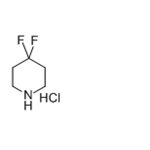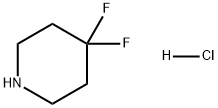4,4-Difluoropiperidine hydrochloride: properties, applications and safety
Dec 13,2023
General Description
4,4-Difluoropiperidine hydrochloride is a versatile compound with significant properties and applications. It is a crystalline solid with high solubility in water, making it valuable in pharmaceutical and chemical industries. 4,4-Difluoropiperidine hydrochloride shows promise in treating neurological disorders due to its potent enzyme inhibitory effects. Additionally, it is stable, relatively non-toxic, and useful in organic synthesis. In the pharmaceutical industry, it serves as an intermediate in drug synthesis and is essential for developing histamine-3 receptor antagonists. However, precautions must be taken when handling 4,4-Difluoropiperidine hydrochloride, as it can cause skin, eye, and respiratory irritation. Adherence to safety guidelines is crucial. Overall, 4,4-Difluoropiperidine hydrochloride's diverse properties and applications make it a valuable compound in various fields.

Figure 1. 4,4-Difluoropiperidine hydrochloride
Properties
4,4-Difluoropiperidine hydrochloride, also known as DFPH, is a chemical compound with several notable properties. Firstly, DFPH is a crystalline solid that is highly soluble in water and other polar solvents. This characteristic makes it suitable for various applications in the pharmaceutical and chemical industries. Secondly, DFPH possesses an interesting pharmacological profile. It exhibits potent inhibitory effects on certain enzymes, particularly those involved in neurotransmitter regulation. This property has led to its investigation as a potential candidate for the treatment of neurological disorders such as Alzheimer's disease and Parkinson's disease. Furthermore, DFPH demonstrates good stability under ambient conditions, making it convenient for storage and transportation. Additionally, it has relatively low toxicity, further adding to its appeal for research and development purposes. Lastly, DFPH has shown promise as a building block in organic synthesis due to its unique structure and reactivity. It can be readily modified and incorporated into various organic molecules, offering versatility for the creation of new compounds with desired properties. In summary, 4,4-Difluoropiperidine hydrochloride is a versatile compound with excellent solubility, pharmacological potential, stability, low toxicity, and synthetic utility. 1
Applications
4,4-Difluoropiperidine hydrochloride is a piperidine derivative that has found numerous applications in the pharmaceutical industry. It is commonly used as an intermediate in the synthesis of various drugs, and its demand in this regard is substantial. 4,4-Difluoropiperidine hydrochloride also plays a crucial role as a building block in the development of novel histamine-3 receptor antagonists. Histamine-3 receptors are widely distributed throughout the central nervous system, and they play an important role in regulating neurotransmitter release. Therefore, drugs targeting these receptors have potential therapeutic applications in various neurological disorders, including Alzheimer’s disease, attention deficit hyperactivity disorder (ADHD), and schizophrenia. In addition to its use in pharmaceuticals, 4,4-Difluoropiperidine hydrochloride is also used in the development of agrochemicals, such as insecticides and herbicides. Its unique chemical properties make it a desirable starting material for the synthesis of these compounds. Overall, 4,4-Difluoropiperidine hydrochloride is a versatile compound with significant applications in the fields of pharmaceuticals and agrochemicals. Its importance as a building block for novel histamine-3 receptor antagonists highlights its relevance in the development of potential treatments for various neurological disorders. 2
Safety
4,4-Difluoropiperidine hydrochloride presents certain safety considerations that must be taken into account when handling the compound. It is known to cause skin irritation upon direct contact, and prolonged or repeated exposure can exacerbate this effect. Therefore, appropriate personal protective equipment, such as gloves and lab coats, should be worn when working with this substance to minimize skin contact. In addition, 4,4-Difluoropiperidine hydrochloride has the potential to cause serious eye irritation. In case of accidental contact with the eyes, it is crucial to flush them thoroughly with water and seek medical attention promptly. Furthermore, exposure to this compound may lead to respiratory irritation, particularly if inhaled in high concentrations or for extended periods. Adequate ventilation should be maintained in areas where 4,4-Difluoropiperidine hydrochloride is handled, and respiratory protective equipment may be necessary in situations where airborne exposure is likely. Overall, proper handling procedures, including the use of appropriate personal protective equipment and adherence to established safety guidelines, are essential to mitigate the potential health hazards associated with 4,4-Difluoropiperidine hydrochloride. 3
Reference
1. PubChem. COMPOUND SUMMARY: 4,4-Difluoropiperidine hydrochloride. National Library of Medicine, PubChem CID: 2758351.
2. Jeffries DE, Witt JO, McCollum AL, Temple KJ, Hurtado MA, Harp JM, Blobaum AL, Lindsley CW, Hopkins CR. Discovery, characterization and biological evaluation of a novel (R)-4,4-difluoropiperidine scaffold as dopamine receptor 4 (D4R) antagonists. Bioorg Med Chem Lett. 2016 Dec 1;26(23):5757-5764.
3. 4,4-Difluoropiperidine hydrochloride. European Chemicals Agency, EC / List no. 604-401-7.
- Related articles
- Related Qustion
- Preparation of 4,4-Difluoropiperidine hydrochloride Nov 5, 2019
4,4-Difluoropiperidine hydrochloride is a heterocyclic fluorinated building block.
1,4-Diaminobutane dihydrochloride is a versatile reagent in chemical reactions and cell culture media for stem cells. Use with caution due to toxicity and irritant properties.....
Dec 13,2023API(S)-1-(2,6-Dichloro-3-fluorophenyl)ethanol is a promising, but potentially hazardous compound for large-scale crizotinib production. Safety precautions are essential for its handling.....
Dec 13,2023API4,4-Difluoropiperidine hydrochloride
144230-52-4You may like
4,4-Difluoropiperidine hydrochloride manufacturers
- 4,4-Difluoropiperidine hydrochloride
-

- $0.00 / 1kg
- 2024-02-26
- CAS:144230-52-4
- Min. Order: 1kg
- Purity: 98%
- Supply Ability: Kgs
- 4,4-Difluoropiperidine hydrochloride
-

- $0.00 / 1kg
- 2022-10-10
- CAS:144230-52-4
- Min. Order: 1kg
- Purity: 98%
- Supply Ability: 1Ton
- 4,4-Difluoropiperidine hydrochloride
-

- $1.10 / 1g
- 2021-10-26
- CAS:144230-52-4
- Min. Order: 1g
- Purity: 99.00%
- Supply Ability: 100 Tons Min




